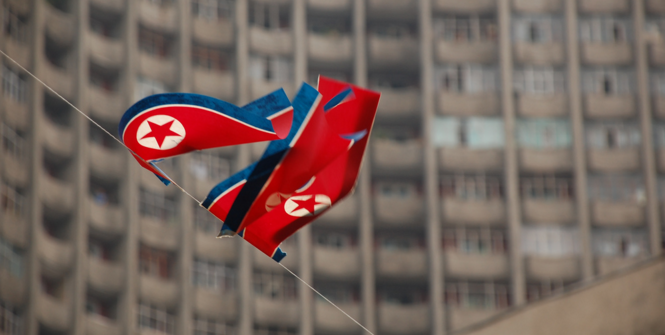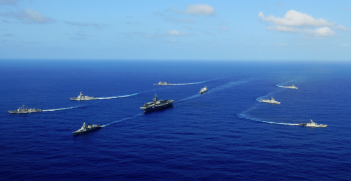Will the Latest North Korean Nuclear Test Cause Beijing to Reassess Its Policy?

North Korea’s fourth nuclear test last week has drawn immediate international condemnations. The UN Security Council held an emergency meeting to discuss Pyongyang’s defiance of the international community and is expected to adopt new sanction measures.
While it remains to be determined if North Korea indeed conducted an H-bomb test – based on preliminary assessments, most analysts doubt this to be the case – serious implications for nuclear non-proliferation, regional security and Sino-US relations persist.
North Korea’s latest test poses serious challenges to the nuclear non-proliferation regime. The 1968 Nuclear Nonproliferation Treaty (NPT) prohibits states – with the exception of P-5 countries (Britain, China, France, Russia, and the United States) – from acquiring nuclear weapons in exchange for access to nuclear technology for peaceful use. North Korea withdrew from the NPT in 2003 and is the only state to do so. It is also the only state to conduct nuclear tests this century.
The international community has been dealing with the North Korean nuclear issue for well over a quarter of a century. In the early 1990s, the Clinton administration had seriously contemplated use of military force against North Korean nuclear facilities. The crisis was averted with the signing of the October 1994 Agreed Framework, which froze North Korea’s plutonium program. In return, the United States and its partners agreed to provide North Korea with two light-water reactors.
The deal would eventually collapse after the Bush administration determined that Pyongyang had engaged in covert uranium enrichment program. Then the second North Korean nuclear crisis broke out. President Bush dubbed North Korea, together with Iran and Iraq, as the “Axis of Evils”. In the aftermath of the September-11 terrorist attacks, nuclear proliferation became the most serious threat to US and international security.
Between 2003 and 2008 the Six Party Talks were held in Beijing. This was a multilateral process that included China, North and South Korea, Japan, Russia and the United States and sought to end the North Korean nuclear program through peaceful negotiations. Several rounds of negotiations culminated in the September 2005 Joint Statement, in which North Korea pledged to abandon its nuclear weapons and return to the NPT.
North Korea conducted its first nuclear test in 2006 and withdrew from the multilateral process in early 2009. It subsequently resumed the nuclear program and conducted two more nuclear tests in 2009 and 2013, respectively. Meanwhile, North Korea continues to develop and test ballistic missiles, despite and indeed in defiance of numerous UN Security Council resolutions and sanctions.
Since early 1994, three US administrations from Clinton to Obama have sought to engage North Korea through diplomacy and with economic benefits, trying to persuade Pyongyang to give up its nuclear weapons program. At the same time, Washington has demonstrated its resolve and maintains a strong military presence in South Korea to deter North Korean aggression.
Clearly, these have yet to result in the dismantlement of North Korean nuclear program. While the Obama administration has maintained a policy of “Strategic patience”, which essentially ignores North Korea until and unless it seriously considers giving up its nuclear weapons and suspending missile tests, it has supported the South Korean government’s efforts to engage the North, either through a policy of reciprocity or trustpolitik. At the same time, Washington believes that Beijing holds the key to the resolution of the North Korean nuclear issue.
Indeed, Secretary of State John Kerry has publicly suggested that China’s policy on North Korea has failed, triggering quick rebuke from Beijing. While the United States and China share common interests in North Korean denuclearization and have indeed coordinated over the years, their assessments of the situation, priorities and expectations are quite different and these have prevented the two powers from developing and executing strategies with the same pace and focus. For Washington, the fact that North Korea is increasingly dependent on China for its survival should give Beijing leverage to pressure Pyongyang to give up its nuclear weapons program. For Beijing, on the other hand, it considers the tension between North Korea and the United States a major cause of the North’s insecurity.
In addition, Beijing has to worry about the consequences of regime instability or worse, collapse – massive refugee flows, major disruption in regional economic development, not to mention the custody of North Korea’s nuclear weapons and materials. Beijing opposes the use, or threat of use, of military force in solving the nuclear issue and only supports limited sanctions while Washington has never ruled out the option of regime change and prefers tougher sanctions. While Beijing went along with renewed and more stringent sanctions on North Korea, it does not regard these as the most effective or even preferred instruments.
This does not mean that Beijing acquiesces in North Korean behaviour. To the contrary, it is just as frustrated and at times angered by its erstwhile client state. The Chinese foreign ministry issued a strong statement condemning the test and Beijing is likely to join other powers in imposing additional sanctions. However, these sanctions would be rather limited and targeted, not across-the-board sweeping sanctions.
The North Korean nuclear test will again test Beijing’s patience and raise the question of what to do about this recalcitrant client. There will be open debates and Chinese analysts will condemn Kim Jong Un but China is not likely to cut off everything to really inflict pains on Pyongyang, for fear that may lead to instability, something China has been trying to avoid for years. However, there are steps China can take, including really tightening up the existing sanctions, supporting new sanctions and reducing economic aid to North Korea such as oil supplies.
But at the end of the day, China views the North Korean situation not just as an issue of nuclear proliferation but as something directly related to peninsula stability, Northeast Asian balance of power and the broader ramifications on US-China relations and China’s role/position in the region, including its ties with other major powers. Given the emerging Sino-US competition and rivalry, punishing North Korea beyond a certain extent would not necessarily benefit China.
Jingdong Yuan is an Associate Professor at the Centre for International Security Studies, University of Sydney. This article may be republished under a Creative Commons License.





